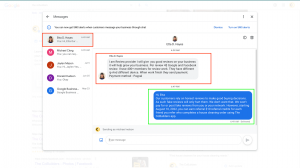Integrity is key: How The CoBuilders protect consumers from fake reviews - CEO
Companies posting fake reviews of their products online may think it's a harmless way to boost sales, but it can harm customers.
Customers rely on reviews to make important financial decisions. Fake reviews can cause serious harm to consumers. Integrity at the company level is the best defense.”
FORT WORTH, TEXAS, UNITED STATES, July 29, 2022 /EINPresswire.com/ -- Online reviews have become a part of modern-day online shopping. When shoppers are looking for a product or service to meet their needs, they often read online reviews about other consumers' experiences. A survey showed that 62 percent of US online shoppers rely on reviews.— CEO, Bukola Michael Nelson
While reviews can help provide information about a product or service, there is a darker side to it: fake reviews. Fake reviews are written to boost the reputation of a product or service and can hurt customers. Fake reviews are also sometimes used to harm another person's reputation.
How fake reviews are hurting customers
Many shoppers rely on reviews to make informed decisions because they want to buy the best product at the best price. Unfortunately, not all reviews are honest. Some are written by people who have received free products in return for a review, while others are made up. The increasing number of fake reviews makes it difficult for customers to trust the information they find online.
Fake customer reviews hurt business integrity in multiple ways. For one, the reviews may deter customers from buying products or services, and they can reflect poorly on a business brand. If people believe that a product or service is terrible, that could stunt the chance of future business growth.
Companies posting fake reviews of their products online may think it's a harmless way to boost sales, but it can harm customers. Fake reviews create an unfair playing field and make it more difficult for honest sellers to compete on consumer concerns, like quality, features, and price.
Amazon has sued administrators of more than 10,000 Facebook groups for attempting to recruit people to write misleading reviews in exchange for money or free products. The misleading reviews were for Amazon products sold in the US, Germany, the UK, Japan, France, Spain, and Italy.
Fake reviews can give customers a false sense of security, making them more likely to buy a product that is not as good as it seems. They can also be harmful because they can drown out legitimate reviews from actual customers.
How to spot a fake review
Research showed that 39 percent of online reviews are unreliable. The top categories for unreliable reviews include electronics, home décor, apparel, beauty, health products, pets, and more. But what if you can't tell whether a review is real or fake? Here are ideas on how to spot a fake review:
1. Check for incorrect spelling or grammar, recycled words or phrases, and made-up or wrong information about the product.
2. Check the reviewer's profile. Many phony reviewers will have little or no information on their profile, or they'll have made only one or two reviews.
3. Look for patterns. Fake customer reviews often have similar wording and formatting.
4. Look for signs of sincerity in the reviews. For example, if the author claims they have been to the location or tried a product, but they seem unfamiliar with it, it's more likely that the review is fake.
5. Look for negative ratings and comments about the same product or service on other websites. These will help you determine if the review is likely bogus.
6. Watch out for red flags. For example, if you think someone may have falsified their experience, or the rating does not seem believable, that could be a red flag. You can email or write to the author to let them know what you think of their review and ask for clarification.
The CoBuilders Assurance
Fake reviews can harm customers. They may not be true; in some cases, they may even be scams. The CoBuilders, a tech company, based in Fort Worth that just launched the world's first house cleaning delivery app, believes in the importance of protecting consumers from fake reviews.
The CoBuilders CEO Bukola Michael Nelson said that "customers rely on reviews to make important financial decisions. Fake reviews can cause serious harm to consumers. Integrity at the company level is the best defense."
The CoBuilders recently got accreditation and was assigned an A+ Rating by the BBB or Better Business Bureau. Users of The CoBuilders app can easily report any suspicious reviews for removal.
Bukola Michael Nelson
The CoBuilders LLC
+1 903-373-5330
email us here
Visit us on social media:
Facebook
Twitter
LinkedIn
Other
Legal Disclaimer:
EIN Presswire provides this news content "as is" without warranty of any kind. We do not accept any responsibility or liability for the accuracy, content, images, videos, licenses, completeness, legality, or reliability of the information contained in this article. If you have any complaints or copyright issues related to this article, kindly contact the author above.



